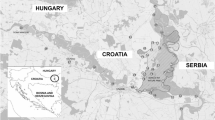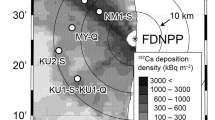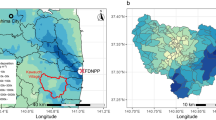Abstract
THIS communication reports an exploratory study of radioactivity in natural and cultivated vegetation. Thirty-five species of angiosperms and mosses, representative of a wide range of non-calcareous woodland, bog and fen habitats, were collected, and twenty samples of roots and tops from seven species of cultivated vegetables, near Windermere during early 1958. For a wider view, nineteen collections of the bog moss Sphagnum papillosum were made in various parts of the Lake District, and two near Garrigill and Malham in the Pennines. In addition, eleven stream and lake waters were analysed. Twenty-seven herbarium specimens of wild plants collected in the decade prior to 1947 were also examined. Their activity, due to long-lived natural isotopes, can be taken as little lower than when collected.
This is a preview of subscription content, access via your institution
Access options
Subscribe to this journal
Receive 51 print issues and online access
$199.00 per year
only $3.90 per issue
Buy this article
- Purchase on Springer Link
- Instant access to full article PDF
Prices may be subject to local taxes which are calculated during checkout
Similar content being viewed by others
References
Bryant, F. J., Chamberlain, A. C., Morgan, A., and Spicer, G. S., Atomic Energy Res. Estab., HP/R 2353 (1957).
Author information
Authors and Affiliations
Rights and permissions
About this article
Cite this article
GORHAM, E. Accumulation of Radioactive Fall-out by Plants in the English Lake District. Nature 181, 1523–1524 (1958). https://doi.org/10.1038/1811523a0
Issue Date:
DOI: https://doi.org/10.1038/1811523a0
This article is cited by
-
Fall-out Radioactivity in Southern Sweden
Nature (1960)
-
Some calculations on radioactive fallout with especial reference to the secular variations in potential gradient at Eskdalemuir, Scotland
Geofisica Pura e Applicata (1959)
-
Deposition of Strontium-90 and its Content in Vegetation and in Human Diet in the United Kingdom
Nature (1958)
Comments
By submitting a comment you agree to abide by our Terms and Community Guidelines. If you find something abusive or that does not comply with our terms or guidelines please flag it as inappropriate.



